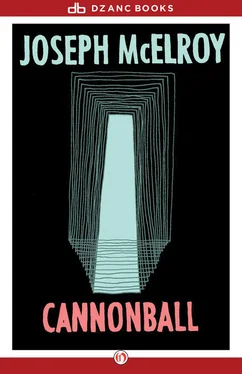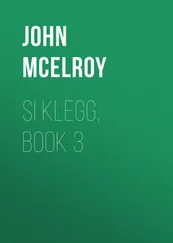Joseph McElroy - Cannonball
Здесь есть возможность читать онлайн «Joseph McElroy - Cannonball» весь текст электронной книги совершенно бесплатно (целиком полную версию без сокращений). В некоторых случаях можно слушать аудио, скачать через торрент в формате fb2 и присутствует краткое содержание. Год выпуска: 2013, Издательство: Dzanc Books, Жанр: Современная проза, на английском языке. Описание произведения, (предисловие) а так же отзывы посетителей доступны на портале библиотеки ЛибКат.
- Название:Cannonball
- Автор:
- Издательство:Dzanc Books
- Жанр:
- Год:2013
- ISBN:нет данных
- Рейтинг книги:5 / 5. Голосов: 1
-
Избранное:Добавить в избранное
- Отзывы:
-
Ваша оценка:
- 100
- 1
- 2
- 3
- 4
- 5
Cannonball: краткое содержание, описание и аннотация
Предлагаем к чтению аннотацию, описание, краткое содержание или предисловие (зависит от того, что написал сам автор книги «Cannonball»). Если вы не нашли необходимую информацию о книге — напишите в комментариях, мы постараемся отыскать её.
continues in McElroy's tradition of intricately woven story lines and extreme care regarding the placement of each and every word. A novel where the sentences matter as much as the overall story.
Cannonball — читать онлайн бесплатно полную книгу (весь текст) целиком
Ниже представлен текст книги, разбитый по страницам. Система сохранения места последней прочитанной страницы, позволяет с удобством читать онлайн бесплатно книгу «Cannonball», без необходимости каждый раз заново искать на чём Вы остановились. Поставьте закладку, и сможете в любой момент перейти на страницу, на которой закончили чтение.
Интервал:
Закладка:
No surprises for Liz, even if Umo was twenty, which he wasn’t. China doesn’t let you travel just like that, I said. She said she wasn’t surprised even considering they had lots of people there. She seemed to take for granted what I told her of Umo, that is the circumstances noted or unmentioned that called forth his family (if any were left), his reports of them, even the gathering of these upon me tightened by my motive for (though I hadn’t announced it) enlisting: Umo’s mother taking him to see a leopard in a forest, her fear of water, her winters keeping sheep along the desert borderlands of the steppes before his part-Manchu father one spring delivering a porcelain pot made with his own hands, met her in a village and ran off with her and brought her home to his family’s astonishment if not horror. The woman followed the man for some reason of love.
Liz didn’t think that happened in China. She was hardly someone you’d say you couldn’t keep up with, yet I would listen always.
Was it indifference in her to something? It didn’t seem so, moist, her eyes weighty as bees on the hunt or mysteriously bright, everything instinctively regulated, tender, infinitely slow her touch, the cocoa-mat-imprinted troughs of scar upon my chest less angry than a while ago. What did she think of me beyond love? She didn’t like my father. She had even told him so one night, and everyone laughed. Liz had dropped in for a piece of my mother’s Thursday chocolate mud. She had an evil look in her eye, my mother said — though that was next morning. She liked Liz. Which said it all, my sister said, with that slant of hers. Which you can’t explain to people who don’t understand it, any more than I could achieve anything by sharing with Liz all the sometimes mysterious encounters with The Inventor and his store of work. (I loved her, but.) A drawing sketch he had brought back long ago for a dam porous enough that it wouldn’t destroy downstream silt. His new type of oven made of local earth and porous stone encouraging interconnecting ovens, easing the division of labor and multiplying the product a hundredfold (like a thought of mine dreamed up for a Global paper); his ice-skating rink shrine of Five Triangles for the Descendant ( Which “descendant”? “Thomas.” “Which rink?” “Oh far away in China, somewhere like that.” “‘Thomas’?” “Forget I ever said it,” The Inventor guided me to another object. A Thomas in China? I murmured, persisting. “Very ancient,” said The Inventor. “You know Chinese?” I asked. Inventor acted modest; he had once had to translate a page of English into Chinese.)
It must have been when I was still diving, because one of our every other Saturdays or Sundays the Inventor’s door was locked and nobody home. Milt pounded on the door a little too long and rapped with the knocker so it sounded up and down the deserted street. We went away, it was like the future — was that it? Milt and I had an argument, I forget what about. In fact, a rich customer who worked for the City had paid to send The Inventor on a trip to bring back the Bengali plane but then did not buy it. Other goods he brought back — from Bangalore — included an antique pinhole camera found on an island in one of those garden lakes; the camera had been used to draw a huge bull as well as a great droog, that subtle topographical eminence, a fortified hill, and the camera was said to even contain the subject matter it had been used to help the artist to draw. It was less than two weeks The Inventor was gone, it was when I was still diving because he changed the subject to that, when I asked where he had gone; because I had only been to Mexico, and only Baja with my dad and when I told my sister, who was up in her room and had never been to The Inventor’s, she said, “He went to find his wife.” “What would he need with a wife?” I said, and she, “Don’t ask me.” “What would you say if I did?” “He brought her back because—” “He did?” “—because a temple would have been too big to bring, and we build them here,” my sister said, her head now on my shoulder, for I knew we were on the same plane whether I understood her perfectly or not.
He did bring her back?
First I’d heard. Maybe I didn’t know him in that way, or rather, he me. Not his house either, apart from the main floor…
Quite a while ago, it seems, some Indian gadgets and models you could find in The Inventor’s stock if you looked to outdate fission or poison weaponry — these would have seemed the material side of concepts contained often in his familial backroom envelopes like facts a spy might pass on to outwit war itself if one could only tell the idea to invent the invention. (Were there spies who didn’t know it?) So that when I felt Umo hear me say something that would help him prosper, I felt myself unknowingly a part of a real job or even war effort, yet kept from a danger that would help me. I asked what goods my friend Umo had trucked north for The Inventor from Mexico, who, not the least surprised that I knew Umo, pointed to minute Christmas mangers made by convicts out of nuts, and an ancient Chinese (though Mexican-made) tool for cutting rhizomes from the Goldthread plant, imitation antique knives — had there been three blind women traveling in the back of that truck as we heard? If so why were they not apprehended? As if what you didn’t see would not trouble you.
I didn’t ask, finding myself confronted one afternoon where I had expected ancient Nature by several small depictions of murder grouped around a colorful Mesopotamian picture of men in headgear, a Muslim embassy kneeling before the throne of an Abyssinian “king of kings” seeking the extradition of certain Islam converts I learned (but could never have guessed — nor the Chinese part of it), and this plus the scene of a beloved’s funeral flanked by mourning leopards and antelopes and delicate, bending trees Liz would not have cared to know about, no more than the full range of The Inventor’s wares. A “Book of Brothers” he took from my hand with a shake of his head, objects for sale that were not for sale, a tiny white China dog like no mutt I’d ever seen in my neighborhood, long snout pointed like a turnip, short legs I imagined to be powerful for fast running, I took it up in both hands all two inches of it, and turned it to see if it had a dick and found its eyes to be minute dots of shiny black, and became aware of The Inventor shaking his head but in some prophetic apology I later surmised — Not for Sale — Don’t Touch. But if it was for sale how much would it go for? I thought, letting it go from my fingers only. Not of interest to Liz, I felt sure, but definitely to my sister, also the pained (sometimes) cast of his face, unable to speak at length of something when speaking at length was what he was good at. Except that if I had ever brought Liz here her niceness or whatever it was and casual intuitions which she herself would have forgotten a day later would have interested our host.
The things there. Why were they so important? Maybe they weren’t. A small painting of two women blind you could tell from how they were led by a blind, hooded person. A well-thumbed 1939-40 World’s Fair catalogue with a well-built guy leaning forward on his toes about to go off the high platform of the Aquacade interested The Inventor, too. “It makes you think,” he said. We thought about that. “He played Tarzan in the movies, you know,” said The Inventor. “You used to be a diver,” he said. “No more,” I said. “You can’t do everything. You are a thinker or a healer perhaps.” (I the healer?) He’d known me since I was ten. “Go regularly to the library,” said The Inventor. “Ten dollars?” I held up the catalogue. Too much, I felt. Yes, the catalogue cost ten dollars. No discount offered, none asked for. (For some reason my uncle was a source occasionally of extra cash.) “Where is your friend Milt today?” Milt was angry because of a claim The Inventor had made for the saliva of an old man he knew the chemical composition of which could help you see better if not cure blindness itself though produced pretty weird sight where people walked up to you like low-flying aircraft and L.A. palm trees which was better than blindness probably. Yet Milt was a guardian of manners. He knew of the China dog. When one day I asked why wasn’t it for sale, Milt muttered, “Whatsa matter with you?” But The Inventor confessed he’d acquired it in exchange once for — he paused. “In… China ,” I said, not quite knowing and in that instant, an instinct, a picture that receded like a small wave on the beach or a shadow in the corner of your eye, a great thing, though — that you would do , but you can’t bring it back. What passed between The Inventor and Umo? In reply to one question I could ask The Inventor, many people nowadays, without legal ID, knew how to come and go across national borders. “Even as young as Umo,” I said. “He knows his way around,” said The Inventor.
Читать дальшеИнтервал:
Закладка:
Похожие книги на «Cannonball»
Представляем Вашему вниманию похожие книги на «Cannonball» списком для выбора. Мы отобрали схожую по названию и смыслу литературу в надежде предоставить читателям больше вариантов отыскать новые, интересные, ещё непрочитанные произведения.
Обсуждение, отзывы о книге «Cannonball» и просто собственные мнения читателей. Оставьте ваши комментарии, напишите, что Вы думаете о произведении, его смысле или главных героях. Укажите что конкретно понравилось, а что нет, и почему Вы так считаете.












